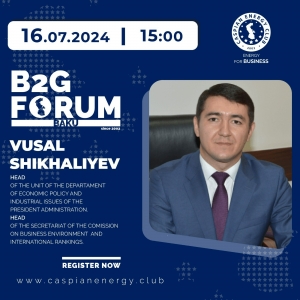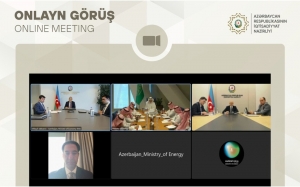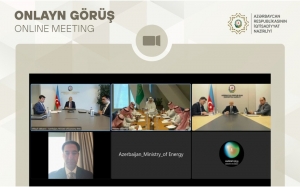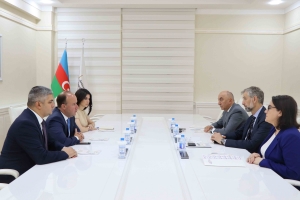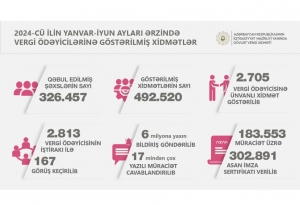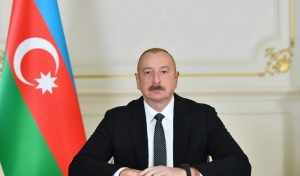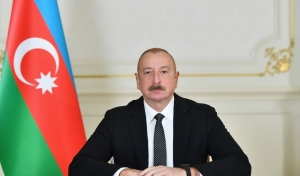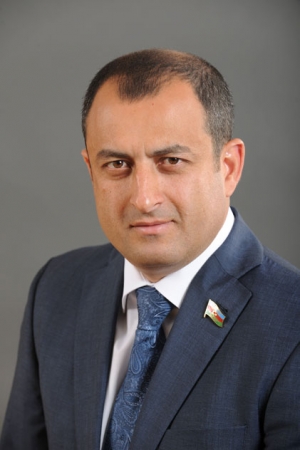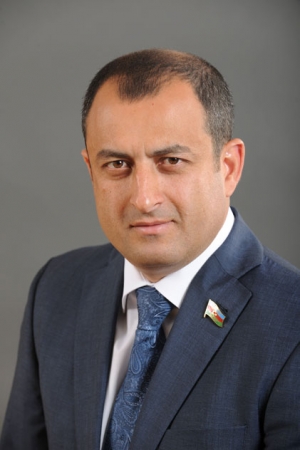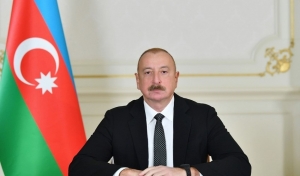Super User
Состоится очередная встреча между предпринимателями и представителями государственных органов
16 июля при организации Caspian Energy Club состоится очередной B2G Forum. Об этом сообщил председатель и главный исполнительный директор группы Caspian Energy Club Тельман Алиев.
Следует отметить, что в качестве почетного гостя в форуме примет участие заведующий сектором мониторинга, координации и оценки экономических реформ отдела по вопросам экономической политики и промышленности Администрации Президента Азербайджанской Республики, руководитель секретариата Комиссии по деловой среде и международным рейтингам Вусал Шихалиев.
Во время мероприятий в формате B2G Forum, организованных для содействия диалогу между бизнесом и государством, представители компаний получают ответы на свои вопросы, заслушиваются мнения и предложения.
Подробнее: https://forms.gle/J6cUZgs8Nd6asr7q6
Azərbaycanla Səudiyyə Ərəbistanı "yaşıl enerji" əməkdaşlığını müzakirə edib
Azərbaycan və Səudiyyə Ərəbistanı "yaşıl enerji"yə keçid sahəsində davam edən layihələr və potensial addımlar istiqamətində birgə fəaliyyəti nəzərdən keçiriblər.
Caspian Energy Media xəbər verir ki, bunu iqtisadiyyat naziri Mikayıl Cabbarov "X" sosial şəbəkəsindəki hesabında bildirib.
Onun sözlərinə görə, müzakirələr energetika naziri Pərviz Şahbazovla birlikdə Səudiyyə Ərəbistanının energetika naziri Əbdüləziz bin Salman Əl-Səud ilə videokonfrans formatında keçirilən görüşdə baş tutub. Tərəflər energetika sahəsində fəal əməkdaşlığın dəstəklənməsi barədə fikir mübadiləsi aparıb.
Азербайджан и Саудовская Аравия обсудили сотрудничество в сфере зеленой энергетики
Азербайджан и Саудовская Аравия обсудили совместную деятельность в рамках текущих проектов и потенциальных шагов в области перехода на зеленую энергию.
Как сообщает Caspian Energy Media, об этом министр экономики Микаил Джаббаров написал в своем аккаунте в социальной сети "X".
По его словам, обсуждения состоялись на совместной с министром энергетики Пярвизом Шахбазовым встрече в формате видеоконференции с министром энергетики Саудовской Аравии Абдулазизом бин Салманом Аль-Саудом.
Стороны провели обмен мнениями по вопросам активного сотрудничества в области энергетики.
Dövlət Xidmətində Beynəlxalq Standartlaşdırma Təşkilatının (ISO) Baş katibinin müavini ilə görüş keçirilib
İqtisadiyyat Nazirliyi yanında Antiinhisar və İstehlak Bazarına Nəzarət Dövlət Xidmətində Beynəlxalq Standartlaşdırma Təşkilatının (ISO) Baş katibinin müavini Silvio Dulinski ilə görüş keçirilib.
Caspian Energy Media İqtisadiyyat Nazirliyi yanında Antiinhisar və İstehlak Bazarına Nəzarət Dövlət Xidmətinə istinadla xəbər verir ki, görüşdə standartların dünya iqtisadiyyatında rolu, ölkəmizdə beynəlxalq standartların tətbiqi, eləcə də standartlaşdırma sahəsində əməkdaşlığın genişləndirilməsi məsələləri müzakirə olunub.
Görüş zamanı həmçinin ISO-nun keyfiyyət təminatı sahəsində siyasəti, qurum çərçivəsində qarşılıqlı əlaqələrin gələcək perspektivləri, beynəlxalq standartların təşviqi, eləcə də təşkilatın illik iclası və digər məsələlər barədə fikir mübadiləsi aparılıb.
Cari ilin ilk 6 ayında 302.891 Asan İmza sertifikatı verilib
2024-cü ilin yanvar-iyun aylarında vergi ödəyicilərinə xidmət mərkəzlərində ümumilikdə 326.457 şəxs qəbul edilib, onlara 492.520 sayda xidmət göstərilib ki, bunun da 185 minə yaxını şifahi xidmətlərə (müraciət etmiş şəxslərin vergi qanunvericiliyi və inzibatçılığı ilə əlaqədar suallarının cavablandırılması), 103 minə yaxını isə elektron xidmətlərə (bəyannamələrin və hesabatların, habelə müxtəlif ərizələrin tərtibatına və elektron formada göndərilməsinə köməklik göstərilməsi) aiddir.
Caspian Energy Media Dövlət Vergi Xidmətinin mətbuat xidmətinə istinadən xəbər verir ki, dövr ərzində ümumilikdə 183.553 müraciət üzrə 302.891 Asan İmza sertifikatı verilib.
Prezident Beyləqana yeni icra başçısı təyin edib
Əziz İmran oğlu Əzizov Bakı şəhəri Suraxanı Rayon İcra Hakimiyyətinin başçısı vəzifəsindən azad edilib.
Caspian Energy Media xəbər verir ki, Prezident İlham Əliyev bununla bağlı Sərəncam imzalayıb.
Dövlət başçısının digər Sərəncamı ilə o, Beyləqan Rayon İcra Hakimiyyətinin başçısı təyin olunub.
Новым главой ИВ Бейлаганского района назначен Азиз Азизов
Президент Азербайджана Ильхам Алиев назначил нового главу исполнительной власти Бейлаганского района.
Caspian Energy Media сообщает, что распоряжением главы государства на эту должность назначен Азиз Азизов.
Ранее Азиз Имран оглу Азизов занимал должность главы ИВ Сураханского района Баку.
Адиль Алиев назначен главой Исполнительной власти Сураханского района
Адиль Абыш оглу Алиев назначен главой Исполнительной власти Сураханского района города Баку.
Caspian Energy Media сообщает, что распоряжение об этом подписал президент Азербайджана Ильхам Алиев.
Отметим, что А.Алиев был вице-спикером Милли Меджлиса VI созыва.
Adil Əliyev Suraxanı Rayon İcra Hakimiyyətinin başçısı təyin edilib
Adil Abış oğlu Əliyev Bakı şəhəri Suraxanı Rayon İcra Hakimiyyətinin başçısı təyin edilib.
Caspian Energy Media xəbər verir ki, Prezident İlham Əliyev bununla bağlı müvafiq Sərəncam imzalayıb.
Qeyd edək ki, A.Əliyev VI çağırış Milli Məclisin vitse-spikeri olub.
Президент назначил нового главу ИВ Гусарского района
Новым главой исполнительной власти Гусарского района назначен Сахир Полад оглу Мамедханов.
Как сообщает Caspian Energy Media, соответствующее распоряжение подписал президент Азербайджана Ильхам Алиев.




